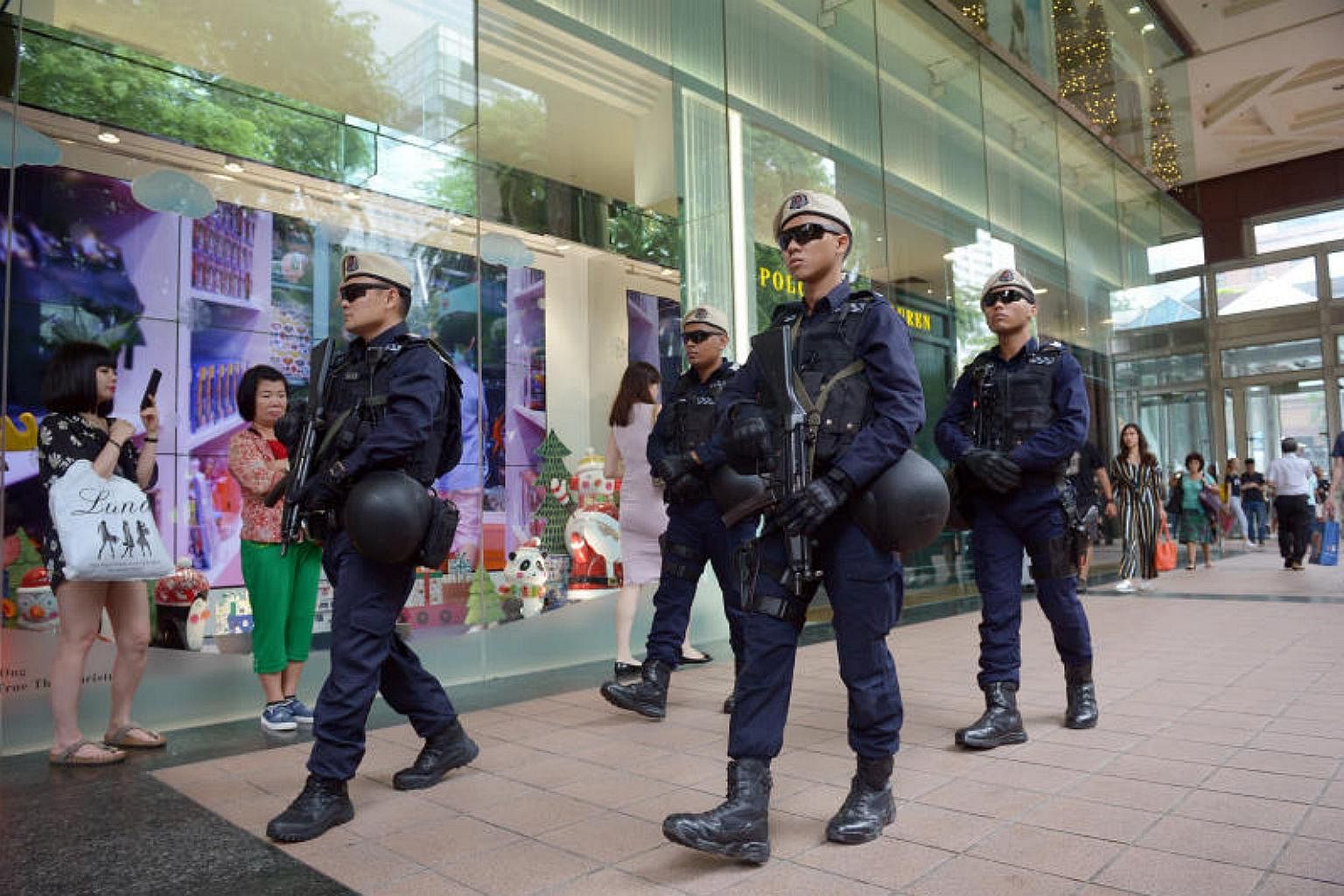New quick-response counter-terrorism teams deployed in areas with high human traffic
Sign up now: Get ST's newsletters delivered to your inbox

Singapore Police Force's In-situ Reaction Teams from the Protective Security Command patrol around Ngee Ann City shopping complex in Orchard Road on Dec 15, 2017.
ST PHOTO: ALPHONSUS CHERN
SINGAPORE - The Singapore Police Force (SPF) has introduced new quick-response teams at some of Singapore's more iconic attractions to boost the Republic's counter-terrorism efforts.
Since Dec 1, In-Situ Reaction Teams (IRTs) have been deployed in popular areas in Singapore, such as in Orchard Road and Marina Bay, to heighten security during the festive period. IRT officers, recognisable by their distinctive beige berets, will largely be stationed in areas of high footfall.
Part of the SPF's Protective Security Command (ProCom), the teams will complement existing ground response forces and emergency response teams. As IRTs are already situated in pre-determined areas, they are likely to be the first responders in the event of an attack.
The new counter-terrorism force comes on the back of a string of terror attacks, such as the Central London attack on June 3, where attackers drove a van into pedestrians on the London Bridge and launched a knife attack in Borough Market, demonstrating what the police said was "a different modus operandi of terrorists."
Other attacks include the Berlin Christmas market attacks on Dec 19 last year, where a van ploughed through a Christmas market and killed 12, and a series of terror attacks in Paris on Nov 13, 2015, killing at least 130 people.
Assistant Commissioner of Police and ProCom Commander, Manimaran Pushpanatan, said: "The mission of the IRT is to deter, detect and respond to threats similar to that you've seen in Paris and London. All IRT officers... are trained in special tactics and are more proficient in the use of high-powered weaponry to counter these threats on the ground."
IRTs, which will largely be made up of full-time national servicemen (NSFs), go through stringent selection and training. They are required to undergo a three-week programme after their six-month NSF basic training.
pecial Constable Sergeant Jared Chang Joo Xyang, who is in the pioneer batch of IRT officers.
"They would drill random scenarios into us, and we would have to immediately respond. Terrorists are always changing the way they attack, so the different scenarios are real possibilities of what might happen," said the 19-year-old.
An example he cited was when "a hostage who pretends to be injured suddenly pulls out a gun and pretends to shoot".
He enlisted in January and volunteered for IRT in September. He started training a month later before patrolling with troops this month.
The three-week specialised training will equip each four-man IRT - three NSFs and one regular - with specific skills, such as dealing with hostage situations and heavy-vehicle attacks.
Whether in training or in the field, every IRT officer carries 17kg of gear, including a bullet-resistant helmet and a vest. Every team is armed with HK-MP5 sub-machine guns and Taurus M85 pistols.
On Friday afternoon (Dec 15), Minister in the Prime Minister's Office Josephine Teo was at Takashimaya Shopping Centre in Orchard Road to observe the new team in action.
Said Mrs Teo, who is also Second Minister for Home Affairs and Manpower: "This festive season, our Home Team has once again geared up to ensure Singaporeans remain safe. As the crowds throng the streets, we have also set up IRTs from the ProCom to provide a swift and effective response should there be a terror attack.
"We are entrusting our NSFs with greater responsibilities, as they form the bulk of the IRTs, to work with our regular officers in counter-terrorism efforts."
The SPF said that there will be more forces deployed in the coming years, although it declined to say how many IRTs are in operation.


